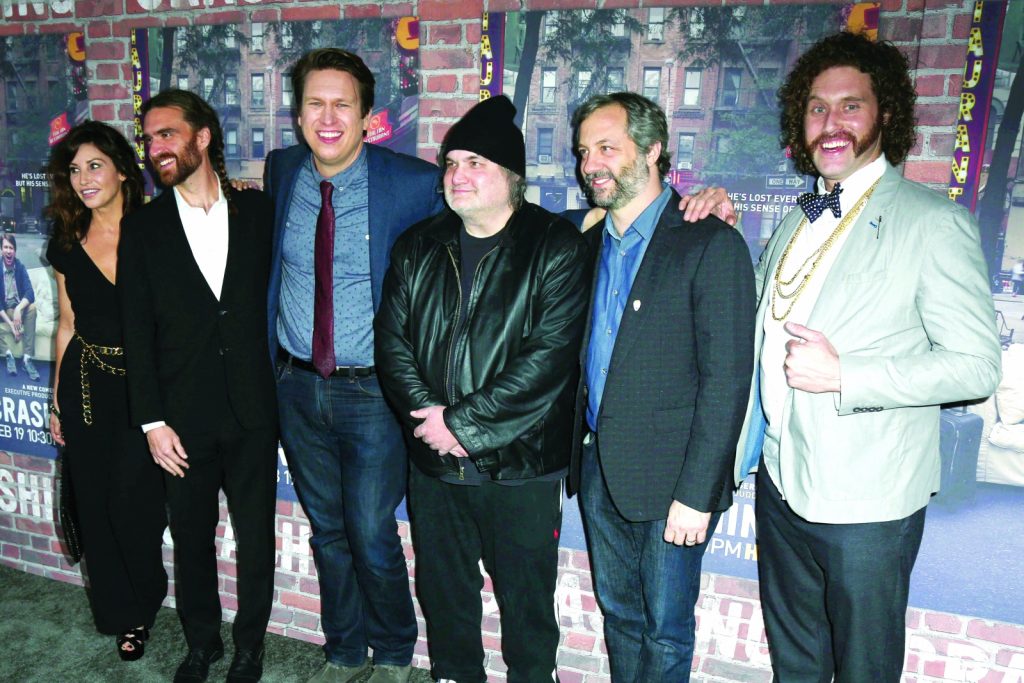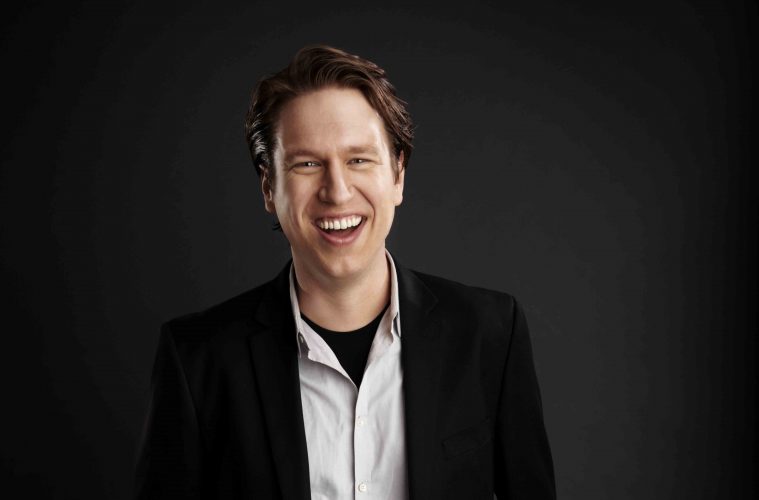If you haven’t heard of Pete Holmes, maybe you’re just not listening. Try tuning into his podcast, You Made It Weird, where you can take in more than 400 deep conversations with fellow actors and comedians. Some of which last three hours! Check out his heady cartoons in The New Yorker. Then watch his hit HBO comedy series Crashing, produced by Judd Apatow, which features a character named Pete Holmes. Soon you’ll start catching on. Pete Holmes is something of a guru for those seeking connection beyond Alexa, Google, and the vibration of the next text.
It makes sense when you consider the spiritual seeking that led Holmes, now 39, to Gordon College in Wenham. There, this native of Lexington relished the sequestered sanctity of a Christian college in the woods. He also performed in the college’s first improv group and wrote a cheeky weekly newspaper column, in which he made fun of mandatory chapel. This was before the long and arduous trek to real adulthood—the path that involved marrying in his early 20s, and divorcing before 30, and navigating the foulmouthed toxicity of the New York City comedy scene, all the while remaining an extremely nice person.
I caught up with Holmes for a phone conversation about his favorite topics—comedy, his gurus, how bad things can lead to good things, why it’s OK for guys to have a feminine side, and why football sucks. Below is an edited version of our conversation.

Gina Gershon, George Basil, Pete Holmes, Artie Lange, and Judd Apatow at the
HBO screening of Crashing at the Avalon in Hollywood.
Q: I’ve been swimming at Gordon College. It’s swim toward the cross and turn. Except I can’t do turns. Did you swim there?
A: In a lot of ways, Gordon kept us from growing up too quickly. We used to go to that pool and just, like, horse around. We didn’t swim laps. We would literally go and splash each other and put each other in headlocks. Like a bunch of grown children. At the time, I enjoyed how buffered and safe it was.
Q: How did attending Gordon College help with your career in comedy?
A: It was good training. Comedy is often like breaking away from something and commenting on it. Which is why a lot of comedians aren’t religious, a lot aren’t married. We are always supposed to be the thing behind the thing, making fun of the thing. Being on a repressed Christian campus was really helpful to me. Even though I was a sweet enough kid, there was so much to make fun of. It taught me that role of commentator. It was fun to watch people’s minds get blown by comedy and ruffling everybody’s feathers. But still maintaining enough likability that you wouldn’t be ostracized.
Q: How did acting in Gordon’s production of Cry Innocent on the streets of Salem prepare you for what you do now?
A: When wearing an overcoat and a flowy shirt and long black soccer socks that pull up all the way to your knees, you learn pretty quickly how not to be embarrassed. We had to stand on pillars and yell at all the tourists that the trial of Good Wife Bishop was about to start. The part of me that was a shy performer died while doing that job. You had to find ways to keep it fresh. In stand-up, we’re repeating material all the time, so it was good practice.
Q: Your show mirrors your own personal history, when your comedy career took off after your marriage ended and you started to question everything. How can you have so much zoomed-out perspective about your own life?
A: I’ve had a long time to process it. My real divorce was over 10 years ago. Going to talk in therapy really helped gain perspective and helped me understand my own culpability. It was also doing my podcast. It was like an experiment. Up until that point, I hadn’t been very open. I was raised to believe that divorce meant failure. On the podcast, I would play a game—how much can I admit or confess and not have people reject me? Week after week, I’d get more open. Over the years, I said every deep, dark secret or strange impulse or feeling or thought that I’ve pretty much ever had, and nobody turned their backs or ran for the hills. That was a really good lesson for me to learn—that it’s OK to be yourself.
Q: What do you say to someone who asks why bad things happen to good people?
A: I think that’s kind of the thesis of Crashing. A funny comedian tells my character something that summarizes the show: “If it sucks, that’s how you know you’re doing it right.” Suffering is the propellant that takes you from where you are to where you are afraid to go. The universe or God pushes us toward what we need, through things we don’t want. My divorce was the worst thing to happen to me at the time. But I wouldn’t be doing what I’m doing now without it.
Q: Your podcast with the actor Jay Duplass of the show Transparent was like a master class in understanding sensitive bros. It was therapy that I needed on a gloomy day. Are you hearing from other people that it’s helping them, too?
A: From what I gather, it helps people a lot. Especially when it comes to men being emotionally honest and vulnerable. We glorify strength, but I really like to shine the light on appropriate vulnerability. That’s a joke I make about Crashing. It’s called Crashing, not Flourishing. I like to show people that a lot of the light and a lot of the goodness happens when things are down. It’s about remaining filled with wonder and curiosity and a little bit of patience. It’s wonderful to hear people say that it ministers to them. It does in a lot of ways what I think church should do, which is make people feel less alone, feel loved for who they are, feel accepted. I certainly go to bed at night feeling like I’m doing my part in the world to make [it] a little bit lighter and happier and honest. I love showing thoughtful dudes that love talking about their fears, their insecurities, and their interpretations of the divine or the lack of the divine. We are all people. Our genders are just part of our identity. If a podcast is a way I can connect deeply, I’ll keep doing it. I like trying to make a contribution to the things that will be relevant in the future and have always been relevant. I think that’s fun. We get caught up in what’s going on. The basics of existence are pretty riveting.
Q: How would you describe your level of apathy about the Patriots’ 2018 Super Bowl loss?
A: The degree to which I don’t care about sports would confound you. My brother and my father, their thing was sports, and me and my mom, our thing was always Jesus. They had the Patriots. We had Ecclesiastes. I just don’t care about it at all. It just doesn’t speak to me. Whenever there are groups of drunk men yelling, I always want to moonwalk away from that situation. I’d rather be anywhere else than around that much masculinity. My parents had season tickets to the Red Sox. I remember my dad asking if I wanted to go to a game and I kind of thought we’d talk, share our secret concerns. But my dad just wanted to watch a baseball game. Sports is dad’s stuff. I’m a mom’s stuff person.
Q: What are your favorite memories of the North Shore?
A: When I go back to New England now, I almost always go to Manchester-by-the-Sea where my friend is a waitress. I get there early, and I’ll drive to Singing Beach. There’s something so crisp and distinctly New England about that area. It feels like we should all be hauling in buoys and checking our lobster traps. It’s a specific type of yearning I feel to be in a cobblestoned community that’s a little bit sleepy that is near the ocean and everybody is really New England, which means like real and they usually have a good sense of humor. I catch myself on these days wishing we could go to Marblehead. I have all these memories of going there with my family and eating seafood. There’s really nothing like it.

